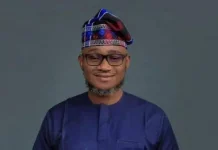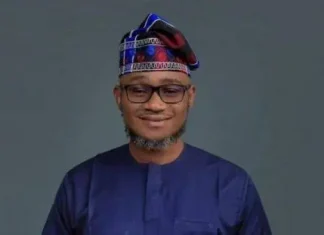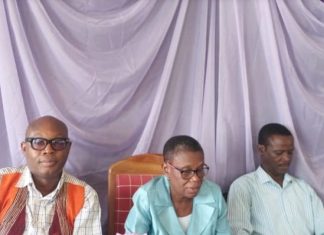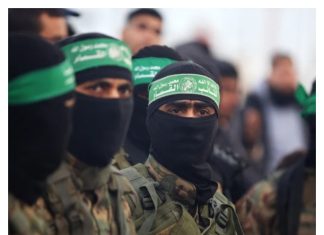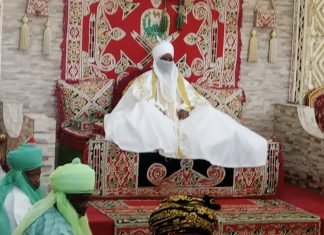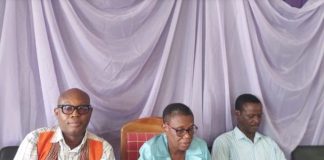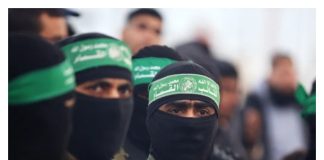By Nwankwo T. Nwaezeigwe, PhD
Prof Farooq Adamu Kperogi’s two articles intended to vilify the dogged Awoist Amazon and Leader of British Conservative Party Rt. Hon. Kemi Badenoch are not only lavish displays of historical incongruities but a magnetic field of historical distortions intended to veneer the substance of historical truism. This is often the case when a non-professional historian engages in intellectual picketing in a historical matter.
The first article titled, “Kemi Badenoch’s Yoruba Identity Meets Inconvenient Truths”, published Saturday December 21, 2024, in his personal blog Notes from Atlanta was his flagship rejoinder to Rt. Hon. Kemi Badenoch’s historically veritable assertion, “Being Yoruba is my true identity, and I refuse to be lumped with northern people of Nigeria, who were our ethnic enemies, all in the name of being called a Nigerian.”
Going through the above piece my impression is that of a scholar-journalist struggling through mismatch of historical facts to debunk Rt. Hon. Kemi Badenoch’s assertion that she is absolutely Yoruba and does not accept the idea of lumping herself with her ethnic enemies. This mismatch of historical facts not only deviated from the trajectory of Rt. Hon. Kemi Badenoch’s assertion but exposed Farooq Kperogi’s limited knowledge of Nigerian history as it relates to pre-colonial intergroup relations.
Historically, the North by British colonial delineation is ethnographically made up of no less than two hundred and fifty ethnic groups of which the Yoruba form a part in the present Kwara and Kogi States. Did Farooq Kperogi in his logical sense of a scholar attempt to ask if the Yoruba of the same Northern Nigeria are included among the northern people of Nigeria Rt. Hon. Kemi Badenoch described as her ethnic enemies?
Did Farooq Kperogi ask which Northern ethnic groups are the real ethnic enemies of the Yoruba Rt. Hon. Kemi Badenoch spoke about, judging from extant historical precedents? Did Farooq Kperogi deem it equally necessary to ask Rt. Hon. Kemi Badenoch to explain the basis of her assertion? These are the fundamental hypothetical questions a professional historian or any rational scholar will put forward before arriving at conclusion.
It is surprising to note that in no single paragraph did Farooq Adamu Kperogi attempt to debunk Rt. Hon. Kemi Badenoch’s assertive statement that the North are the ethnic enemies of the Yoruba. All his arguments on pre-colonial intergroup relations between the Yoruba and the North are pitiably anchored on the pre-colonial interactions between the Old Oyo Empire and his adopted Baatonu people of Borgu which he sees through the historical lens of the etymology of the name “Yoruba.”
There is therefore obvious evidence that Farooq Kperogi does not understand what the North, which forms Rt. Hon. Kemi Badenoch’s basis of argument, stands for in the context of present Nigerian politics. Basing his argument solely on the etymology of the word “Yoruba” to vilify Rt. Hon. Kemi Badenoch’s position on her ethnic identity is not only fraught with historical inadequacies but smack of intellectual pettiness constructed on a befuddling ignorance of the historical dynamics of the present Nigerian nation.
This intellectual pettiness laced with befuddling ignorance of historical dynamics of the Nigerian nation was ignominiously exhibited by Kperogi’s monstrous statement, “If Badenoch truly fancies herself as Yoruba, she’d be wise not to rattle the ancestral tree; she might be startled by just how much Northern Nigeria comes tumbling out of its branches.”
From the above sensational illogicality it is clear that Farooq Kperogi does not understand what ancestral tree means in both historical and ethnographical terms. It also underscores Kperogi’s low-level understanding of what the North means in Rt. Hon. Kemi Badenoch’s conception. Is Kperogi telling us that the North is constructed on one ancestral tree or monolithic ethnic identity? Is Farooq Kperogi equally telling us that the Borgu eponymous root of the word “Yoruba” as he claims equally translates to origin of Yoruba people from Borgu? So what ancestral tree was he talking about?
The same intellectual pettiness laced with befuddling ignorance of the historical dynamics of the Nigerian nation was carried further in his second article titled “Borgu, Northern Nigeria, and Yoruba History” published Saturday, January 11, 2025, also in his personal blog Notes from Atlanta, which was indeed a response to Dr. Lasisi Olagunju’s rejoinder to his December 21, 2024 article.
Farooq Kperogi’s misleading contraptions further received a back-up from his Fulani kinsman Yushau A. Shuaib with an article titled “On the Etymology of ‘Yoruba’ by Northerners” published in Nigerian Tribuneonline issue of Monday January 13, 2025. Yushau Shaibu’s article is indeed fascinating not only because it fervently raised the issue of historiography in support of Farooq Kperogi against Lasisi Olagunju’s account on the etymology of the word “Yoruba”, but because it equally explains Farooq Kparogi’s misapplication of historical facts.
In other words, when Yushau Shaibu wrote, “Stories may incorporate history, but not all stories are historical”, he was indeed making obvious reference to Farooq Kperogi’s article on Rt. Hon. Kemi Badenoch. Prof C. Behan McCullagh in his article titled, “Bias in Historical Description, Interpretation, and Explanation”, published in Vol. 39, No. 1, 2000 issue of History and Theory informs us that, “It is useful to distinguish history that is misleading by accident from that which is the result of personal bias; and to distinguish personal bias from cultural bias and general cultural relativity.” This is where Farooq Kperogi erred in his wobbly flamboyant intellectual promenade against Rt. Hon. Kemi Badenoch.
As a historian, I do not contest the Northern etymology of the word “Yoruba.” This has always been my view. I do not also contest the fact that it was originally a reference to Oyo sub-ethnic group of what is collectively known as Yoruba in Nigeria today, before its collective application as a common ethnic identity through the literary influence of such Oyo-born returnee freedmen as Bishops Samuel Ajayi Crowther and James Johnson. Indeed the distinctive ethnic facial mark of a typical Oyo (Yoruba) is the multiple vertical scarifications on both sides of the cheek.
But the question is to what extent does this matter of etymology of the word “Yoruba” contradict Rt. Hon. Kemi Badenoch’s assertion, except as applied by Farooq Kperogi as a witty distraction to the main subject matter? This is because it a common knowledge that the term “Yoruba” as an identity definition of an ethnic group only applies to Nigeria. In Benin Republic where Farooq Kperogi’s Fulani maternal and paternal grand-parents migrated from, Togo and Ghana, the Yoruba are known as Anago. In Sierra Leone where they constitute the most influential Creole group, they are known as Aku.
Farooq Kperogi might not be aware that there are six Yoruba towns in Igboland, located in the present Aniocha North Local Government Area of Delta State whose language is still referred to as Olukwunmi and not Yoruba by their Igbo neighbors. Like Farooq Kperogi who is ethnically Fulani but currently claims Baatonu of Borgu identity, and Gambari-Fulani of Ilorin bearing Yoruba names and speaking Yoruba language while retaining their Fulani cultural identity, the Yoruba-speaking people of Igboland bear Igbo names, claim Igbo ethnic identity, and speak Igbo, while retaining their Yoruba language and cultural identity. The same sequence of nomenclature equally applies to Farooq Kperogi’s Baatonu people of Borgu who are variously known among the Yoruba as he aptly noted, by the names “Bariba, Baruba, or Ibariba.”
In historical terms, every original identity or name associated with any individual, town or ethnic group is an exonymous derivative. Every individual is given a name without his consent from birth. The same applies to names of towns and ethnic groups. Benin kingdom is variously referred to as Ado and Idu respectively by the Yoruba and Igbo. The origin of the word “Igbo” still remains a riddle among historians, ethno-linguists and ethnographers.
The Hausa gave the Tiv the name “Munshi”, while the term “Hausa” was imposed by Arab traders against their original names of Habe, Arewa and Maguzawa. The term “Fulani” which was alien to pre-colonial Nigeria and even today to most West and Central African nations outside Nigeria originated from a Hausa derogatory reference to Fulani Islamic mendicants (beggars) begging for Fura (Millet cake balls) to supplement their Nunu (Cow milk).
Generally, to the Hausa, the present people collectively known as Fulani are made up of two different ethnic groups sharing one common Fulbe language—the real Fulani known as the Bororo who are the depository of cattle herding, and the Toronkowa or Torodbe who represent the sedentary Fulani ruling class. This explains why the general term for the Fulani in both Cameroon and Central African Republic is Bororo.
In fact, the earliest name applied by the British in reference to the Fulani was Fellata which was Kanem-Borno, Sudanese and Arab term. Elsewhere in West Africa, they are variously known as Fulbe, Fula, Peuhl, and Peul. All these references by incident of historical dynamics are exonyms. One does not therefore understand the basis of Farooq Kperogi’s highfalutin arrogance clothed in embarrassing ignorance of the historical application of the concept of exonym when he sardonically wrote:
“I can bet my bottom dollar that most northern Nigerians are uninterested in any claim to kinship with her, either. Well, since Ms. Badenoch hates northern Nigeria that much, she might also consider rejecting even the term Yoruba, as it originates from—of all places—northern Nigeria! “Yoruba” is, after all, an exonym first bestowed upon the Oyo people by their northern neighbors, the Baatonu (Bariba) of Borgu, before it was shared with the Songhai (whose scholar by the name of Ahmad Baba has the distinction of being the first person to mention the name in print as “Yariba” in his 1613 essay titled “Al-kashf wa-l-bayān li-aṣnāfmajlūb al-Sūdān”).”
Does the origin of a people’s name debar the same people from having the originators of the name as their enemies? Is there any historical law that outlaws a group from giving their enemies names? The name “Nigeria” was a British colonial geographical expression, to parody the great sage Chief Obafemi Awolowo, to describe hundreds of culturally, linguistically, and politically diverse ethnic nationalities bonded together to form an incompatible nation-state. So was the Rt. Hon. Kemi Badenoch not right when she emphatically asserted that she considers herself as a Yoruba and not Nigerian; and that she has no business being bonded together with her northern ethnic enemies?
Farooq Kperogi in his infantile rumination informs us that because the name “Yoruba” was concocted by Northerners as a collective identity of all the people who trace their origin to the eponymous Oduduwa, the like of Rt. Hon. Kemi Badenoch should shower praises on those who gave them a name they know not its meaning and which was imposed on them by the British for administrative convenience. According to him:
“The name’s embrace as a collective identifier owes debts to these historical facts. In other words, Yoruba is not a Yoruba word. It traces etymological descent from northern Nigerians, Badenoch’s “ethnic enemies.”
Indeed what Farooq Kperogi is saying by the above statement is that even the Igbo ethnic group should be grateful to the Hausa for giving them the name “Inyamiri.” It is ridiculous that a Professor of an American university will be thinking in such specious intellectual manner. Rt. Hon. Kemi Badenoch raised three fundamental hypothetical issues—ethnicity, enmity, and the North; none of which was addressed in its conceptual merit by a Professor of communication Arts from an American university; rather we are inundated with absurd contraptions of historical ambiguities clothed in infantile intellectual arrogance.
I do not contest the incident of cross-migrations between the Yoruba of Old Oyo Empire and her northern neighbors, especially the Borgu, Nupe, Ebira and Igala. But what Farooq Kperogi failed to understand within his trifling knowledge of Nigerian history is that first, Old Oyo Empire did not embrace the entire territory known today as Yorubaland. Most of the subgroups outside Oyo subculture group were outside Old Oyo Empire sphere of political control.
The greater part of what is today Yorubaland in Nigeria was more or less under the sphere of Old Benin Empire political influence, especially the Eastern Yorubaland defined by the present Ondo, Ekiti and parts of Osun and Ogun States, including Lagos State up to the present Badagry. On the other hand, Western Yorubaland within Nigeria’s national borderland which has been judiciously dealt with by such Yoruba historians as Professors Biodun Adeniran and Anthony Asiwaju, extends to the present Benin and Togo Republics, and had the Fon of Dahomey to deal with.
Furthermore, beyond the influence of Islam on which Farooq Kperogi based his thesis of cultural commonality between the Yoruba and their Northern ethnic neighbors, the Yoruba are closer both culturally and linguistically to the Edo, Igala and Igbo than his Borgu and Fulani ethnic heritages. Whereas the Yoruba, Edo, Igala and Igbo belong to the same Kwa sub-family of languages, Baatonu language of Borgu belongs to Gur sub-family of languages, Fulfulde language of the Fulani on the other hand belongs to West Atlantic sub-family.
Secondly, Faroog Kperogi still reeling in his limited knowledge of Nigerian history fails to understand that Old Oyo Empire, like its Benin, Fon, Igala, and Kwararafa (Jukun) counterparts was multiethnic in character with his Baatonu ethnic group of Borgu forming just a part. Like the cases of Old Benin and Igala kingdoms in which some Igbo held high offices, it was not therefore unusual that some loyal members of Baatonu ethnic groups of Borgu should hold high political offices in Old Oyo Kingdom. For instance, the Achadu of Igala Kingdom who doubles as the Prime Minister and Kingmaker traces his origin to Igboland.
Thus although Farooq Kperogi had labored spiritedly to impress us with his fabulous evidence of Baatonu ethnic group of Borgu immigrants who became assimilated into the larger body of Yoruba ethnic group, yet such fusion does not mitigate the incident of hatred between the Yoruba as a group and their Borgu or other northern ethnic neighbors if the reason for such enmity arises.
It might interest Farooq Kperogi to know that not only do many Oba in Ondo, Ekiti and Osun States, including the Eleko (Oba) of Lagos, trace their origins to Benin Kingdom, President Bola Ahmed Tinubu’s paternal root is traced to the same Baatanu of Borgu. This explains why he had the privilege of being conferred the title of Jagaban, a chieftaincy title exclusively reserved for indigenes. Similarly, the current Oshodi of Lagos, including such prominent Yoruba political personalities as Femi Fani-Kayode and Bayo Onanuga trace their ethnic roots to Nupe (Tapa); just as Farooq Kperogi claims to be Baatonu of Borgu in Nigeria while tracing his maternal and paternal origins to Borgu-Fulani (Borgu-Fula) of Parakou town in northern Benin Republic.
One might not be much concerned with Farooq Kperogi’s hybrid ethnic identity because as Harald Haarmann rightly put it in his book, Language in Ethnicity: A View of Basic Ecological Relations, “ethnicity is a phenomenon that cannot be characterized in any single feature but must be described as a cluster of features which are different in kind and which include language oriented as well as non-language oriented criteria.”
The historical ethnic identity of the present Fulani ruling class in Nigeria is an important instance. The truth about Usman dan Fodio’s origin is that he was never a Fulani by ethnic identity but a Tukolor of Futa Toro kingdom located in the present Republic of Senegal. The Tukolor who are distinctly negroid by racial definition like their Serer and Wolof neighbors adopted Fulfulde—the Fulani language, first as their lingua franca which subsequently developed into their mother tongue.
It is therefore right to state that both ethnically, physiognomic sense and even culturally, Shehu Usman dan Fodio and his descendants, including all the members of the present Fulani ruling class—the Sultan of Sokoto, Emirs and all those in high government positions who parade themselves as Fulani in Nigeria today are not truly Fulani in the ethno-linguistic sense of Fulani ethnic identity but ethnic Tukolor. The main ethnic Fulani are the Bororo Fulani herdsmen. This explains why the Hausa refer to them as Bororo while referring to Fulani ruling class variously as Torodbe, Torodo and Toronkawa—meaning variously Toro and Tukolor people.
Indeed as Prof B. O. Oloruntimehin, in his book, The Segu Tukolor Empire informed us, the Fulbenization of the sedentary Tukolor appears to have occurred during their centuries of long domination by the Denyanke Fulani of Senegal under the Saltingi dynasty, until the Tukolor revolt of 1769 under Suleyman Ba which overthrew the Denyanke Fulani ruling class.
It is therefore unfortunate that a widely read scholar of communication arts should be delving into historical incongruities as a refuge for his ignorance of Nigerian history. Farooq Kperogi’s infantile statement that, “Well, since Ms. Badenoch hates northern Nigeria that much, she might also consider rejecting even the term Yoruba, as it originates from—of all places—northern Nigeria!”, is not only smack of intellectual pettiness but a befuddled display of cerebral confusion arising from truncated understanding of the very thesis of exonym he raised.
The fact that there are historical basis of Kemi Badenoch’s stance on hatred of the North is obvious by Farooq Kperogi’s attempt to veneer the facts of Yoruba history in relation to the North with historical trivialities miscalled exonym. In fact Farooq Kperogi’s penchant for misrepresentation of historical facts driven by unproven imperious hypothesis puts him in the category of peripatetic scholars of known but not understood. He informs us that:
“Centuries before colonialism and the British-supervised formation of Nigeria, much of what we know today as northern and western Nigeria have had robust relational and cultural encounters, evidence of which still endures in the contemporary linguistic and cultural artifacts of the people.”
What were the features these “robust relational and cultural encounters, evidence of which still endures in the contemporary linguistic and cultural artifacts”? We are not informed by Farooq Kperogi outside the few obscure Arabic vocabularies that are incidental to Islamic influence in Yorubaland. Moreover, Farooq Kperogi in his figment of imagination believes that all Yoruba, including Kemi Badenoch’s Ondo State came into contact with Islam like the Oyo.
In the case of Rt. Hon. Kemi Badenoch, there are incontrovertible copious historical evidence both pre-colonial and post-colonial that overtly underscores her assertion that the North are her ethnic enemies. First, let us begin by the concept of North in Rt. Hon. Kem Badenoch’s view which indeed allies with the universal view of majority of Nigerian Christians and Southerners today.
It is clear from the trajectory of Rt. Hon. Kemi Badenoch’s resentment that the North she spoke about is not synonymous with the British colonial geopolitical expression called Northern Region of Nigeria of which a large chunk of Yoruba ethnic groups are included. Her definition of the North and Northern ethnic enemies is anchored on the ethno-religious complexities of the geo-political Northern Nigeria in which the Fulani-led Muslim oligarchy defines itself as the real Northerners, while the non-Muslim mainly Christian minority ethnic groups are considered second-class citizens and not real Northerners.
The personal encounter of the Nupe-born Prof Jerry Gana will suffice to further illuminate this trajectory of Rt. Hon. Kemi Badenoch’s position. First, when President Olusegun Obasanjo nominated Prof Jerry Gana as a Minister of the Federal Republic of Nigeria in 1999 representing Niger State, those who claim to be the real Northerners led by Farooq Kperogi’s Fulani ethnic kinsmen protested on the ground that Prof Jerry Gana, a Nupe by ethnic extraction was not a true Northerner. His only crime was being a Christian.
In 2017 when those who call themselves authentic Northerners demanded the balkanization of Nigeria, Prof Jerry Gana made it clear that he belongs to Middle Belt Region and not North. As he put it in the following words as reported by Punch issue 3rd July 2017:
“They think when it comes to break-up, we will go along with the North. We have already told them that if they allow this country to break up, we are not going with the North. We are staying where we are. So, just take notice. If it comes to that, we will tell you that you are Arewa and we are ‘Middle-Belters.’”
It was however Major Gideon Orkar’s April 22, 1990 abortive coup speech that clearly defined the true North:
“In the light of all the above and in recognition of the negativeness of the aforementioned aristocratic factor, the overall progress of the Nigerian state, a temporary decision to excise the following States, namely, Sokoto, Borno, Katsina, Kano and Bauchi States from the Federal Republic of Nigeria comes into effect immediately until the following conditions are met.”
These five ostracized States of Federal Republic of Nigeria consist the present Sokoto, Kebbi, Zamfara, Katsina, Kano, Jigawa, Bauchi, Gombe, Borno, and Yobe States. These are the core Muslim North with interfacing extensions in Kaduna, Niger, Kwara, Nasarawa, Adamawa, and Taraba States. The Fulani domineering oligarchy in these States are not only ethnic enemies to the Yoruba as Rt. Hon. Kemi Badenoch rightly asserted but collective enemies to the entire Nigerian Christians.
There are proven episodes of Nigerian history that clearly underscore Rt. Hon. Kemi Badenoch’s assertion which cannot totally be exhausted within the present limited space.
First, the Yoruba civil war of 19th century was provoked by the Fulani attack and destruction of the Old Oyo Kingdom’s Capital City of Katunga (Oyo-Ile), in which the action resulted to massive southward migration of the refugees. This in turn provoked a chain reaction that subsequently led to the civil war resulting to many Yoruba being captured and sold into slavery. Was this action not heinous enough for any Yoruba patriot like Rt. Hon. Kemi Badenoch to consider the North as defined by Farooq Kperogi’s Fulani ethnic group as his or her ethnic enemies?
Second, the same Fulani led by Alimi who instigated the Aare Ona Kakanfo of Oyo Kingdom Afonja to betray his people. Afonja was eventually killed by the same Alimi who subsequently usurped his throne and consequently turned his descendants and the entire Yoruba ethnic group in Kwara State today as second-class citizens in their own ancestral land under the Fulani colonial political structure miscalled Ilorin Emirate. Is this historical episode not adequate enough to consider the North as defined by the Fulani ethnic group enemies of the Yoruba?
Thirdly, Chief Obafemi Awolowo in page 51 of his book, Path to Nigerian Freedom, which was published in 1947, quoted the following statement by the Sultan of Sokoto in 1942, which still defines the reason of the present state of insecurity in Nigeria:
“Holding this country together is not possible except by means of the religion of the Prophet. If they want political unity let them follow our religion.”
The question to Farooq Kperogi is why shouldn’t Rt. Hon. Kemi Badenoch, a granddaughter to a celebrated Methodist Church Priest consider the maker of the above statement an enemy to not only the vast majority of Yoruba Christians but the entire Christians of the Nigerian nation?
Fourthly, in 1962 these same ethnic enemies to the Yoruba used their Federal Government powers to set up Chief Obafemi Awolowo and eventually handed him a 10-year prison sentence for treason on September 11, 1963, for fighting against injustice perpetrated by these ethnic enemies of the Yoruba. Yet Farooq Kperogi would develop intellectual running-stomach because Rt. Hon. Kemi Badenoch re-echoed this obvious fact of history.
Finally, does one need to tabulate the number of innocent Yoruba men and women with children slaughtered by Farooq Kpeogi’s Fulani kinsmen since 2015 when the hawkish Fulani jihadist Muhammadu Buhari became President of the Federal Republic of Nigeria? Just to mention few instances.
On Sunday June 5, 2022 being the Day of Pentecost, these same Northern enemies of the Yoruba invaded Owo the hometown of the sitting-Governor of Ondo State and slaughtered forty peaceful Christian worshippers at St Francis Xavier Catholic Church. To the like of Farooq Kperogi, this was the kind of good relationship between the Yoruba and their Northern ethnic enemies he wrote about.
On Monday, January 29, 2024, these same ethnic enemies of the Yoruba defined by Farooq Kperogi’s Fulani ethnic group murdered two traditional rulers in Ekiti State. The two Oba were the Onimojo of Imojo Ekiti, His Royal Highness Oba Olatunde Olusola in Oye Local Government Area and the Elesun of Esun Ekiti, His Royal Highness, Oba Babatunde Ogunsakin in Ajoni, Ikole Local Government Area of Ekiti State. To Farooq Kperogi, this act was not heinous enough for sensible Yoruba patriots to consider the North as represented by the Fulani as their ethnic enemies.
The point which however has to be made known in clear terms to Farooq Kperogi is that he is too infinitesimal in both moral and intellectual terms to cast invidious aspersions on the person of Rt. Hon. Kemi Badenoch for expressing her stance on an obvious incontrovertible history fact, whatever might be his professorial status in whatever university he sojourns in the United States.
Rt. Hon. Kemi Badenoch represents the pinnacle of ethical political values which no Fulani intellectual scavenger like Farooq Adamu Kperogi can undermine by any means. She is an epitome of sagacious political model with the modesty of sublime patriotism driven by a strong sense home-grown historical consciousness.
A lady of clinical eloquence, radiating cerebral carriage and logical magnetism, Rt. Hon. Kemi Badenoch is definitely an Amazon of exceptional gift from God, a living political goddess threading fearlessly on the same political thoroughfare the exalted leaders of our erstwhile British Colonial masters once threaded, and grandly sitting with logical confidence on the same political throne once sat the likes of Baroness Margaret Thatcher, Sir Edward Heath, Harold Macmillan, Sir Anthony Eden, Sir Winston Churchill, David Lloyd George, Arthur James Balfour, William Ewart Gladstone, and Benjamin Disraeli.
Although unapologetically a Yoruba patriot without taint, Rt. Hon. Kemi Badenoch represents a shining political elixir not only to her Yoruba ethnic nation but the entire Nigerian Christendom. Her vilification by any band or set of morally corrupted and politically bankrupt elements in Nigeria or elsewhere will be considered an insult to the entire Nigerian Christians.
***Dr. Nwankwo Tony Nwaezeigwe was formerly Director, Centre for Igbo Studies, University of Nigeria, Nsukka, and presently Odogwu of Ibusa and President, International Coalition against Christian Genocide in Nigeria (ICAC-GEN) He currently writes from exile in Metro-Manila, Philippines. Email: nwaezeigwe.genocideafrica@gmail.com website: https://icac-gen.org
Share your story or advertise with us: Whatsapp: +2347068606071 Email: info@newspotng.com





